Israel
EVERY SO often an extraordinary book appears with potential to bring change—or at least advance justice by mitigating nationalism or prejudice. Rabbi Michael Lerner’s Embracing Israel/Palestine: A Strategy to Heal and Transform the Middle East is such a book. The appeal is clear: Be both pro-Palestinian and pro-Israeli and pray for the best for each.
The book is a gut-wrencher as it describes the results of cyclical violence and reaction that fuels descent into paralyzing trauma and anger for both Arabs and Israelis.
Lerner, an advocate for Middle East justice and founder of Tikkun magazine, speaks truth about the human-made tragedy of the Israeli/Palestinian conflict. His transformative counsel about what people and nations can do to participate positively is desperately needed. Social justice advocates have been offered a candid and honest reprise of the tragic thinking and actions of oppressed people who should have known better than to visit the same on “the other.”
Lerner’s way toward peace is grounded in many years of living in and traveling to Israel/Palestine, loving the two protagonists equally, and constantly exploring his and others’ souls. In spite of the victimizing and traumatizing of both Jews and Arabs, he remains hopeful. Embracing makes for a compelling and even inspiring read. I devoured most of it in two sittings, captivated by Lerner’s vision.
How can we save 40,000 lives in under three minutes?
That question served as the provocative title of Israeli medic Eli Beer's TEDMED talk. Beer is the founder and president of Israel-based United Hatzalah (which is Hebrew for "rescue"), a rapid response team of 2,000 skilled volunteers — EMTs who range professionally from "expensive lawyers to people who sell fish or shoes," he said to CNN Health.
Beer answered his question this way, "The average response time of a traditional ambulance is 12 to 15 minutes — we reduce it to less than three minutes. Our response is the fastest in the world. We call our approach a lifesaving flash mob. On motorcycles, traffic doesn't stop us. Nothing does."
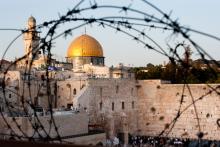
What do you do with critical information on intractable justice issues when reputation, methods, or prevailing propaganda make it difficult for people to believe the truth? How does one find ways to strengthen the fragile line between democracy and the lurking dark social disorder? Limiting or reversing anarchy in the U.S. and abroad may depend on finding ways to persuade and protect the common good.
A current question is in regard to the 20-year Oslo peace process (which was to be completed with separate States after 5 years). When it failed, its successor peace plans promised to bring flourishing democracy and a just peace that would hold back the winds of war and be good for Israelis as well as Palestinians.
The strategy of negotiations with prolonged periods of stalling has only widened the occupation and allowed Israel to strengthen its hold on Palestinian property. It has been conquest by a 1,000 cuts on people (1,500 Israelis and 15,000 Palestinians dead), as well as uprooted trees and bulldozed property. Less than 10 percent of 1967 war land area of Palestine is fully controlled by the Palestinian Authority. It is as though a volcanic cloud blocks the sun. Even with Secretary of State John Kerry’s vigorous efforts to diminish the rumblings and forestall an eruption, those who assure us there are signs of hope declare time is growing mercilessly short.
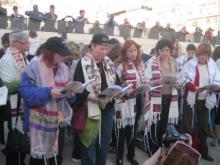
Where once it seemed that uncritical devotion to Israel was the norm for U.S Jews, that Zionism and Judaism were hand-in-glove, new research finds that’s not the case today — if it ever was.
The Pew Research Center’s newly released, comprehensive Portrait of Jewish Americans not only delved into myriad ways people identify as Jews, it also probed their emotional connection and their theological and political ideas about the Jewish state.
GEORGE MITCHELL, the former U.S. senator who famously brokered peace in Northern Ireland, knows the path to peace is unpredictable. “Until it happens,” he said, “you can’t predict with certainty. ... You can’t take ‘no’ for an answer. ... You just have to keep at it until peace is achieved.”
After five years of stalled Middle East peace talks, Secretary of State John Kerry lured Israeli and Palestinian negotiators back to the peace table in July. Sadly, my desk is littered with articles by naysayers who seem more than willing to “take ‘no’ for an answer” when it comes to peace in the Holy Land.
Naysayers point to the expansion of Jewish settlements and the political power of Israeli hawks, as well as the divisions in Palestinian society that convince them there is “no true partner for peace.” Certainly years of disappointments and failed negotiations offer ample cause for skepticism.
But I agree with Faisal Abbas, who suggests that cynicism is a lazy option we can’t afford. “Negotiations may succeed or fail to achieve peace,” he writes, “but the alternative (not having these negotiations) is guaranteed to fail.”
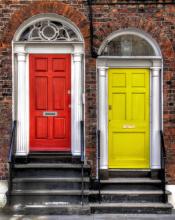
Our relationship to place is so conditioned by our life experiences. When I moved to North Cambridge, Mass., from the expansive West Coast, I got a lesson in the meaning of “near” and “far.” Walking around my new neighborhood, I greeted an old woman sitting in front of her house.
“Did you grow up around here?” I asked.
“Oh no,” she assured me, “I grew up way over on Sherman Street.” Sherman Street is about three blocks from where we were talking, but it is a different neighborhood. So in the language of her personal geography, Sherman Street is not “around here.”
When I traveled to Israel this summer with a group of seminary students from Andover Newton Theological School and Boston University School of Theology, what struck me most was another lesson of geography: If you live in a country the size of New Jersey, your sworn enemy might literally be your next door neighbor.

Upon my recent return from the Middle East (with The Global Immersion Project), I was struck more than ever before at our Western infatuation around military aggression, violence, and division. Not only are these the primary narratives we are fed through our major media outlets, they are the narratives we subconsciously embrace through the latest bestseller, box office hit, or video game. Violence, death, and division have become normative. We are becoming numb to the very things that we – as ambassadors of hope and reconciliation – are to turn from as Resurrection People. It is as though there is a stranglehold on our on our ability to see and participate in the stories of healing and new life.
As surprising as this may be, embedded in the midst of these conflicts are endless stories of hope that never make the latest headline or sound bite. And in the times I've followed Jesus INTO these places of conflict, I continue to encounter stories of peace and hope that embody the Gospel message, stories by real people, happening right now, in places usually known only for conflict, violence, and death.
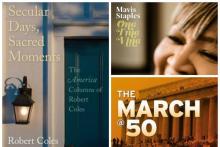
The Dream at 50
This August marks the 50th anniversary of the historic March on Washington for civil rights for African Americans. PBS will feature special broadcast and Web programming, including the premiere of the new documentary The March onTuesday, Aug. 27 (check local listings). pbs.org/black-culture/explore
The Miracle of Meaning
Secular Days, Sacred Moments: The America Columns of Robert Coles, edited by David D. Cooper, collects 31 short essays by the respected child psychiatrist and Pulitzer Prize-winning author. Whatever the topic, Coles offers thoughtful insights on civic life and moral purpose. Michigan State University Press
IN "SILENCE FOR GAZA,” Palestinian poet Mahmoud Darwish captures the contradictions of the coastal enclave, describing it alternately as “ugly, impoverished, miserable,” and “the most beautiful, the purest and richest among us.” Darwish’s antonyms evoke Gaza’s crushing conditions and resilient residents, exemplars of sumud, an Arabic word roughly translated as “steadfast perseverance”—a fundamental form of Palestinian resistance. Darwish’s poem also states that Gaza “did not believe that it was material for media. It did not prepare for cameras and did not put smiling paste on its face.” And yet every person, every story, every image of Gaza illustrates this persistent paradox of a land at once ugly and beautiful.
“I DON’T KNOW why they targeted us. No rockets were fired from our neighborhood,” says citrus farmer Yusuf Jilal Arafat, whose 5-year-old daughter Runan was killed when Israeli warplanes bombed their home. Arafat’s wife, four months pregnant, and their 8-year-old son were found alive in the rubble. His surviving children now suffer from frequent panic attacks at night. Many of Arafat’s trees were destroyed by the bombs, and the ground is covered with oranges now in various stages of decay. Rumors of contamination by Israeli weapons may hurt the sales of his crop, but he will still harvest. The family is living with Arafat’s father-in-law until they can rebuild.
Rebuilding under Israeli import restrictions is no simple task, so salvaging existing materials remains a vital practice—albeit risky, according to structural engineers. But ingenuity-by-necessity is constantly on display in Gaza, whether it’s recovering crushed stone from beneath ruined highways, straightening steel rebar from bombed-out buildings, or pulverizing concrete for reuse in new (but weaker) blocks.
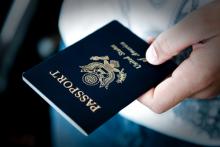
A federal appeals court has ruled unconstitutional a 2002 law that allows Americans born in Jerusalem to designate Israel as their birth country on their passports.
The lawsuit, brought by an American couple whose American son was born in Israel in 2002, challenged the government to uphold the law. Instead the court found it unconstitutional.
The State Department has not permitted Americans born in the city to list “Israel” as their birthplace on their passports, despite the law.

More than 1,100 American Jewish athletes will be competing in the Maccabiah Games, known as the “Jewish Olympics” and held in Israel once every four years.
This year’s event, which begins July 18, brings together more than 9,000 athletes from 77 countries to compete in 38 sporting events. The American contingent is the largest visiting delegation.
The Maccabiah attracts well-known and lesser-known athletes. This year’s participants include swimmers Garrett Weber-Gale, who won gold medals in the 2008 Olympic Games in Beijing, and Mirjam de Koning-Peper, one of three medal winners in the London 2012 Paralympics.
...The army is used as "an institution that promotes social cohesion" and a "principal place" of forming national consciousness and participating in the nation building project "as conceived by the authorities, i.e. promoting Israel as a Jewish national state". In this perspective, according to the Justice and Peace commisssion operating in the Holy Land, "talk about drafting of Christian Arabs rather than the Arabs in general - Muslims and Christians - is clearly an attempt to drive a wedge between Christians and Muslims in Israel". On addressing these delicate problems, the Church should keep in mind that "the army is used as a means of imposing and maintaining the occupation of Palestinian territories and thus preventing Palestinians from achieving dignity and independence". The army is primarily "an army of aggression rather than an army of defense". Therefore "the use of army service to divide the Arab population against itself is detrimental to the interests of the Arabs as a community."
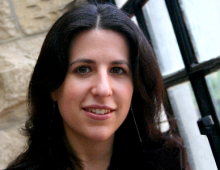
IN HER JEWISH school in Montreal, Ronit Avni learned the tragic history of her people. Her Canadian mother and Israeli father had met in the ’60s when her mother was living in Israel and working as a folk singer, often performing for Israeli troops. Her older sister was born in Tel Aviv, but the family settled back in Montreal in the mid-’70s before Ronit was born.
Not strictly religious but committed to the values of Judaism, Ronit couldn’t help but ask probing questions as she listened to the stories of the birth of the modern state of Israel in 1948. Am I hearing the whole story? How do Palestinian perspectives differ from what my educators and community leaders are teaching? How can we transform this situation from a zero-sum equation to one that respects the dignity and freedom of all?
Years later, having graduated with honors from Vassar College with a degree in political science after studying theater at a conservatory in Montreal, Ronit trained human rights advocates worldwide to produce videos as tools for public education and grassroots mobilizing.
By the time I met Ronit a few years ago, she had narrowed her worldwide focus to the Israeli-Palestinian conflict, where her heart was most deeply drawn. She is the founder and executive director of Just Vision, an organization dedicated to increasing media coverage and support for Palestinian and Israeli efforts to end the occupation and conflict without weapons of violence.
During the last several years, my engagement in the Holy Land has been significantly shaped by Ronit. Her film Encounter Point, about Israelis and Palestinians who have lost family members, land, or liberty to the conflict yet choose forgiveness and reconciliation rather than revenge, gave me hope that peace can emerge from pain.

What does the ancient arrangement of tents in an ancient Israelite encampment have to do with the ultramodern question of whether the U.S. government should be peering into the ultramodern phone and Internet records of hundreds of millions of Americans?
Or to put it another way, are there any spiritual and religious roots to the notion of personal and household privacy?
To start from the Bible: Many Jewish prayer services begin with a quotation from a non-Jewish shaman, himself quoted in the Torah (Num 24:5 — this passage of Torah will be read two weeks from now, on June 22.) There was a king, Balak by name, who hired an expert shamanic curse-hurler, Balaam, to curse the People of Israel who were swarming across the wilderness after their liberation from slavery under Pharaoh.
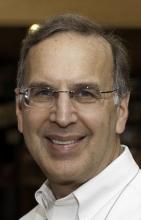
Rabbi Sidney Schwarz, ordained in the liberal Reconstructionist tradition, sees a divide between generations of American Jews that could spell disaster for the community.
One generation he calls “legacy” or “tribal” Jews — those who built the national organizations and synagogues that have served for decades as the backbone of American Jewry. But reams of statistics show legacy Jews have enjoyed limited success attracting younger Jews.
The other is what he calls “covenantal” or “innovation sector” Jews, a younger generation that has founded a myriad of niche Jewish organizations — environmental, social justice and political — that can, in Schwarz’s vision, build on their parents’ work toward a more brilliant American Jewish future.
LIKE MANY Palestinians forced from their homes during the 1948 war, relatives of Jordan’s Sen. Haifa Najjar carried the keys to their Palestinian homes with them as they fled. These keys, passed down through generations, are powerful symbols of Palestinian ties to the land that international law considers theirs—even as their hope for return wanes.
As a Christian appointed by King Abdullah II to Jordan’s upper house of Parliament, Najjar is active in the education, environment, cultural, and legal sectors of the government. She is also superintendent of the Anglican-run Ahliyyah School for Girls and Bishop’s School for Boys in Amman, Jordan.
Within the mix of the 500,000 Palestinians who relocated to Jordan because of the Israeli War of Independence—or Nakba, “the catastrophe,” depending on who you ask—was a vocal minority of Palestinian Christians who joined their ranks with the existing Jordanian Christian community. Prior to 1948, Christians accounted for nearly 20 percent of the population of what is now Israel/Palestine. Today that figure is less than 2 percent. Even more dramatic are declines in the West Bank cities of Ramallah and Bethlehem. Christian populations are nearly extinct in these locations compared to their respective majorities of 90 and 80 percent prior to 1948.*
“They moved not as immigrants; they were initially thinking it was a temporary thing,” says Father Nabil Haddad of the Melkite Catholic Church in Amman. “It is similar to what Syrians are thinking right now when crossing the barbed wire, not the checkpoints, between south Syria and north Jordan.”
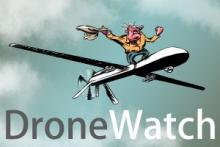
An Israeli jet shot down a drone off its northern coast on Thursday. While some Israeli officials said they believed it was an Iranian-manufactured aircraft sent by Hezbollah, that group denied it. The Associated Press reported:
Israeli military spokesman Lt. Col. Peter Lerner said the unmanned aircraft was detected as it was flying over Lebanon and tracked as it approached Israeli airspace.
He said the military waited for the aircraft to enter Israeli airspace, confirmed it was “enemy,” and then an F-16 warplane shot it down, smashing its wreckage into the sea about five miles (eight kilometers) off the northern port of Haifa. Lerner said Israeli naval forces were searching for the remains of the aircraft.
He said it still was not clear who sent the drone, noting it flew over Lebanese airspace, but that it could have originated from somewhere else.
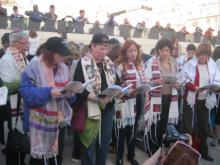
JERUSALEM — The ultra-Orthodox rabbi in charge of the sacred Western Wall assured a government emissary on Thursday that Jewish women will not be arrested if they try to recite the mourner’s prayer at the holy site, despite a warning from Israeli police.
Tensions have grown between traditional Jews and reform-minded women over prayers at the Western Wall, which contains the remains of the Temple that was destroyed nearly 2,000 years ago.
Prime Minister Benjamin Netanyahu has tapped Natan Sharansky, chairman of the Jewish Agency, with defusing the conflict and ensuring “that every Jew in the world can pray in the manner that they are accustomed to at Judaism’s most important national and religious site,” according to a statement issued by the Jewish Agency.

Mr. President, just like the many other visitors that we receive here in this land, we would do our best to overwhelm you with our cultural hospitality and our traditions. I would seize this opportunity to not only welcome you to visit Bethlehem, but also to welcome all U.S. citizens to visit my small city.
I invite you, Mr. President, to be in my city within the nation that has a dream of liberty — a dream that goes in rhythm with all nations’ right of self-determination. We have embraced, as other nations, our pursuit of democracy, human development, and security. We have tumbled through our pursuits and have made mistakes, and because like all humans, as part of our human nature, we slip. We have built, learned, developed, and made our existence known to all nations.
Mr. President, I hope that in your visit you would not only enjoy the blessings of the Holy Land, but be encouraged to return and experience this city to its fullest. After you finish your presidency you will be able to visit without a big security escort and you will enjoy wandering the old streets and spending time in the old city of Bethlehem when you come back with your family.